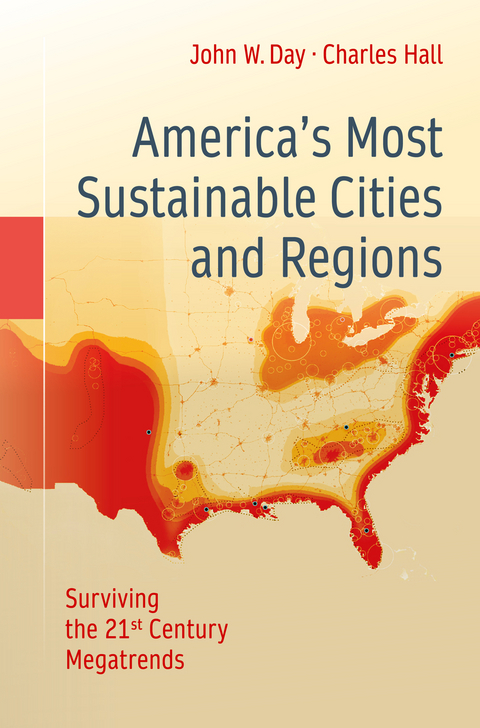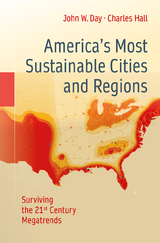America’s Most Sustainable Cities and Regions
Springer-Verlag New York Inc.
978-1-4939-3242-9 (ISBN)
Finite resources will mean profound changes for society in general and the energy-intensive lifestyles of the US and Canada in particular. But not all regions are equally vulnerable to these 21st-century megatrends. Are you ready to look beyond “America’s Most Livable Cities” to the critical factors that will determine the sustainability of your municipality and region? Find out where your city or region ranks according to the forces that will impact our lives in the next years and decades.
Find out how:
·resource availability and ecological services shaped the modern landscape
·emerging megatrends will make cities and regions more or less livable in the new century
·your city or region ranks on a “sustainability” map of the United States
·urban metabolism puts large cities at particular risk
·sustainability factors will favor economic solutions at a local, rather than global, level
·these principles apply to industrial economies and countries globally.
This book should be cited as follows:
J. Day, C. Hall, E. Roy, M. Moersbaecher, C. D'Elia, D. Pimentel, and A. Yanez. 2016. America's most sustainable cities and regions: Surviving the 21st century megatrends. Springer, New York. 348 p.
John W. Day, Jr. is Distinguished Professor Emeritus in the Department of Oceanography and Coastal Sciences, School of the Coast & Environment at Louisiana State University, where he has taught since 1971. He has published extensively on the ecology and management of coastal and wetland ecosystems and has over 100 peer-reviewed publications. He received his PhD in marine sciences and environmental sciences from the University of North Carolina in 1971 working with Dr. H.T. Odum. Since then, he has conducted extensive research on the ecology and management of the Mississippi Delta and deltas in the Mediterranean and Latin America. Charles Hall is a Systems Ecologist who received his PhD under Howard T. Odum at the University of North Carolina at Chapel Hill. Dr. Hall is Professor Emeritus at the College of Environmental Science and Forestry at the State University of New York, and the author or editor of twelve books and nearly 300 scholarly articles. He has worked ortaught in some 30 different countries. He is best known for his development of the concept of EROI, or energy return on investment, which is an examination of how organisms, including humans, invest energy into obtaining additional energy to improve biotic or social fitness. He has applied these approaches to fish migrations, carbon balance, tropical land use change, the extraction of petroleum and other fuels, and how EROI influences the ability of society to achieve different levels of economic and social development. Presently he is developing a new field, BioPhysical Economics, as a supplement or alternative to conventional neoclassical economics, while applying systems and EROI thinking to a broad series of resource and economic issues. Hall's work on EROI has been featured in such media outlets as Scientific American (most recently in April, 2013), Forbes Magazine, and the Discovery Channel.
Introduction.- Manifest Destiny and the Growth of America: Cheap Energy and Spending Natural Capital.- The Myth of Urban Self Sufficiency.- A Tale of Twelve Cities and Ten Regions.- The Wealth of Nature is the Wealth of Nations: Ecosystem Services and Their Value to Society.- Global Climate Change: A Warmer and More Unpredictable Future.- Energy – The Master Resource.- Feeding America’s Cities: Putting Food on the Table in the 21st Century.- Moving Away From a Ptolemic View of the Human Economy.- Revisiting the Cities and Regions.- Summing It Up: Alternative Routes for the Way Forward.
| Co-Autor | Eric Roy, Matthew Moerschbaecher, Chris D'Elia |
|---|---|
| Zusatzinfo | 72 Illustrations, color; 16 Illustrations, black and white; XII, 348 p. 88 illus., 72 illus. in color. |
| Verlagsort | New York |
| Sprache | englisch |
| Maße | 155 x 235 mm |
| Themenwelt | Naturwissenschaften ► Biologie ► Ökologie / Naturschutz |
| Naturwissenschaften ► Geowissenschaften ► Geografie / Kartografie | |
| Sozialwissenschaften ► Politik / Verwaltung ► Politische Theorie | |
| Technik ► Elektrotechnik / Energietechnik | |
| Wirtschaft | |
| Schlagworte | America's Most Livable Cities • America's Most Sustainable Cities Book • End of the Oil Age • Energy and Where You Live • Energy Scarcity and US Economy • Energy Scarcity Implications • Great Recession and the Energy Crisis • Limited Resources and Climate Change • Limited Resources and Economic Recovery • Peak Oil and Sustainability • Sustainability and Place Book • Sustainability at the Landscape Level • Sustainability Map USA |
| ISBN-10 | 1-4939-3242-X / 149393242X |
| ISBN-13 | 978-1-4939-3242-9 / 9781493932429 |
| Zustand | Neuware |
| Informationen gemäß Produktsicherheitsverordnung (GPSR) | |
| Haben Sie eine Frage zum Produkt? |
aus dem Bereich




